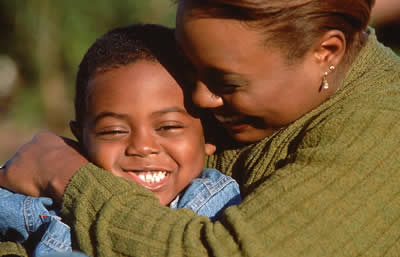In This Issue
|
The Family Corner: Effective discipline for your child
Program Highlight: Thanks for great Holiday Parties
Toys for Tots
Family Support Fund Update: Your contributions are making a difference
Upcoming Events
Real Stories: Maria's Story
|

The Family Corner- Discipline and Punishment...Do you know the difference?
| 
Learning the answer will help you be a better parent, and assure that your children thrive.
Discipline is defined as a positive method of teaching a child right from wrong. Punishment is a form of discipline. Punishment may be physical--as in spanking, or psychological--as in verbal disapproval, isolation or loss of privileges. In reality, punishment represents only one end of a very broad spectrum of discipline techniques. Discipline is a tool to help children learn self-control and take responsibility for their own behavior. Children who are raised in a way that stresses positive discipline will understand their own behavior better, show independence, and respect themselves and others. When punishment is the basis for discipline, the person who punishes the child becomes responsible for the child's behavior because someone other than the child is controlling the decisions. In addition to punishment, there are a lot of other elements of discipline that every parent should keep in their "tool boxes". These include: - Role Modeling. Most children learn how to behave by observing their parents' actions. Whether you realize it or not, they are always watching you. Parents must model the way they want their children to behave.
- Setting Rules. Rules should be reasonable, fair, realistic and explained to children along with the consequences of not following them. A minimum set of rules should be established with attention given to the child's age and developmental level.
- Encourage and Reward Good Behavior. Catch them doing well. When children are behaving appropriately, tell them so! Verbal praise goes a long way.
- Time-Out. Time-out is pretty simple and it works. It involves removing a child from a situation following a negative behavior to calm down, establish control, end inappropriate behavior, and reenter the situation in a positive state. Effective time-outs include an explanation of what the inappropriate behavior is and why the time-out is needed.
- Create Charts, Games or Contests. Using charts to monitor and reward behavior is an interactive way for a child to learn appropriate behavior. This helps them focus on things that are important, and to receive praise when they do well.
Like any tool box, this one is filled with different tools for different purposes. No single tool works for every problem, and overusing any of them will eventually wear out their effectiveness.
The Best tool of all...Love your kids and pay attention to them!
|

Program Highlight- Therapeutic Home Care and SAIL
| |
The SAIL and Therapeutic Home Care's Holiday Parties were great successes, but not without a lot of help.
From Kathy Heffernan, SAIL Program Director:
Our Holiday Party for the young people in the SAIL Program was held at the  Peab ody Office and was a tremendous success. There was tons of food and many, many presents. We were amazed with the generosity that was extended by our contributors, staff and the agency's Family Support Fund. Happy Holidays to all and thank you so much! Peab ody Office and was a tremendous success. There was tons of food and many, many presents. We were amazed with the generosity that was extended by our contributors, staff and the agency's Family Support Fund. Happy Holidays to all and thank you so much!
From Stephanie Magdis, THC Program Director:
I wanted to take pause and thank you all very much for your work in making this year's THC Family Holiday Party a wonderful one. Without your care and attention to all the to-do's on our list, this event would not have come together. There was the collecting of children's gift wishes, invitations and taking reservations, ornament making, tree delivering/construction, churches/family's gift donation and delivery, frantic wrapping, music compiling, decorating to transform a conference room into a party place (who knew we had light dimmers), food ordering/pick-up/deliveries/accounting, the donation of décor and Minute-To-Win-It game knowledge as well as all the materials/prizes to do them, leading game-time for the kids, driving families to and from so those without a car could partake in the festivities, the recruitment of Santa - who put on a fabulous show, post-celebration clean-up. . . . and all this was done while you kept on doing the amazing work you do every day.

The Therapeutic Home Care Team was delighted to celebrate the season with families at our Annual Holiday Party. We want to thank Lynn Powers, Gene and Linda Hebert, and Living Hope Church for helping to make this a very special event for our youth and families. And to Santa - A big thank you for Coming to Town to share the holiday spirit!
Thank you for the time, talent, and genuine care you contributed to making this happen for our families!
|

Toys for Tots
| |
The staff of Family Continuity would also like to thank the folks at Toys For Tots whose generosity provided toys for over 300 children served in our Lawrence, Lowell, Beverly, and Peabody home based and wraparound programs, helping to give them a very happy Holiday season!
|

Family Support Fund Update
| |
As we reported in last month's Newsletter, the Family Support Fund helps families in all of our service areas during the times of their greatest need. To provide this support, Family Continuity receives no funding, other than generous donations from friends, staff and Board members. This year's appeal is still in progress, but already it has exceeded last year. We want to acknowledge the support of some of our generous contributors, including:
$500 Donors
401kQuote.com - Tom Lanahan
DSCI Corporation
Tobin & Sons Moving and Storage, Inc.
$100-$250 Donors
Cross Cultural Communication Systems
Eldredge & Bourne Moving & Storage
MP Roberts Insurance Agency
R&M Realty
The Drumlin Group
|

Upcoming Events-Save the Dates
| Children's League Legislative Advocacy Day:
Tuesday, February 8, 2011
Snow date: Thursday, February 10, 2011
11 am-1 pm
The State House
Grand Staircase, 2nd Floor
Program Highlights:
The Children's Choice Award
Release of the Child and Family Well-fare Platform
Musical Performance by the Plummer Home
Call to Action: Visit Your Legislators!
Getting Real About Family Voice and Choice
March 22, 2011
Bentley College
Family Continuity will be co-sponsoring this conference along with
NAFI (North American Family Institute) and PPAL (The Parent Professional Advocacy League). It is a full day program for parents and professional staff.
|

Real Stories | |
When you are in the middle of a difficult situation, it is difficult to see any end in sight, but with support, we know that things can turn around for every family... Here's a letter from Maria, who talks about the difference learning how to talk to each other can make....
Maria's Story

My family and I first became involved with Family Continuity a few years back. I must admit my children weren't too thrilled with the first few visits to the home for counseling - It was like pulling teeth without Novocain. The kids just weren't having it. Then our counselor, Norma brought a game with her and they really enjoyed it. She found a way to get them talking and playing at the same time. I must say it changed everything. We learned different techniques on how to talk to one another. My days became easier and less stressed. There even was a point when we didn't have a meeting, but the kids wanted to know when the next time was. Read the Rest of the Letter.
|
|
Family Continuity's Mission Statement:
Supporting family success in every community by empowering people, enhancing their strengths, and creating solutions through partnerships to achieve hope, positive change and meaningful lives.
Agency Values: Family, Community, Advocacy, Leadership, and Change Treatment Philosophy, founded on the belief that positive change is always possible:
* The most effective treatment provides a continuity of care, acknowledging that connected, relevant supportive services to clients/client families promote recovery, stability, self advocacy and permanency in the midst of changing needs.
* Therapeutic change occurs in the context of a dynamic treatment partnership between clients and helpers that is founded on choice, respect, honesty, and a shared responsibility for and participation in the development of solutions.
* Effective treatment is empowering and strength-based, recognizing that all clients possess resources for change and that change is possible when these resources are utilized.
* Creating meaningful lives starts with identifying goals and connecting that to individualized, flexible and creative treatment planning that incorporates a client's family/community relationships, culture, and context. |
|
|

E-mail us and let us know you want to be on the list today! Please forward this to others and encourage them to sign up! Click the above box.
| |
|